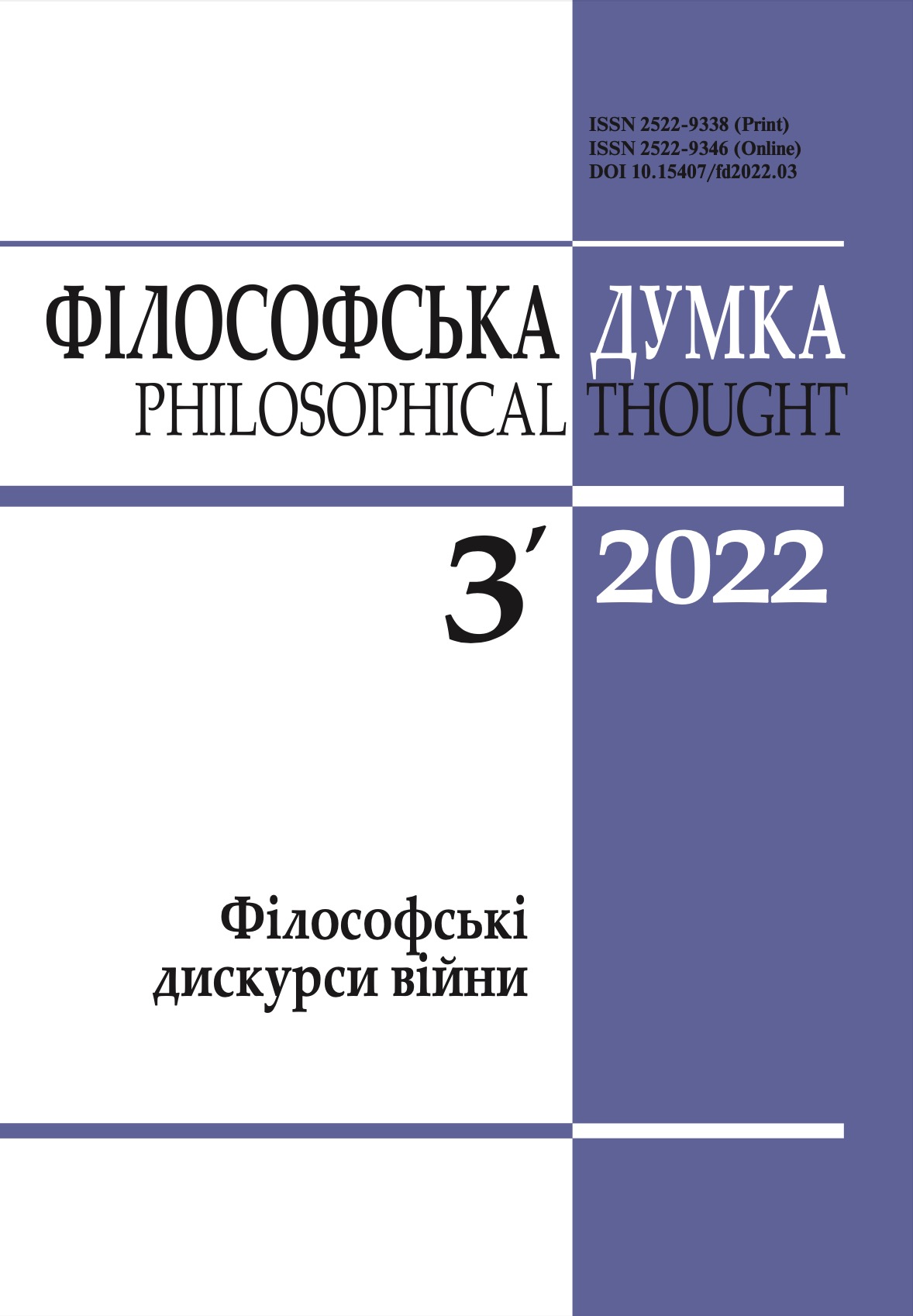THE REALITY OF INFORMATION WEAPONS
Essay
Abstract
The information weapon created and used in Russia's war against Ukraine causes quite tangible physical and quantitative consequences as a weapon of mass destruction of people, and it must be recognized as such. This weapon is monopolized (contrary to the definition of information) by Russia by attributing Nazism and terrorism to Ukraine and is used to create reasons for the physical destruction of an entire nation. In this case, neither the presumption of rationality and meaningfulness, nor the evaluation of the truth/falsehood or verification of this statement or information attribution works. "This discourse of fear, completely built on a common enemy, does not distinguish between traditional right and left ideologies" [Ibidem], truth from fakes created with a specific destructive purpose.
References
Balsa-Barreiro, J., Rossi, E. (2019). The common enemy: How the rhetoric of fear is subverting democracies. SIPA J. Int. Aff (August 25th, 2019). Retrieved from: https://jia.sipa.colum- bia.edu/online-articles/common-enemy-how-rhetoric-fear-subverting-democracies. Access 12 May 2022.
Barthes, R. (1971). Elementos de Semiologia. Rio de Janeiro: Cultrix.
Capeller, W. (2020). The dronification of power: on the (re)emergence of totalitarian semantics.
In: World Society’s Law: rethinking systems theory and socio-legal studies [recurso eletrônico] / Marco Antonio Loschiavo Leme de Barros; Lucas Fucci Amato; Gabriel Ferreira da Fon- seca (Eds.) (pp. 540—561). Porto Alegre, RS: Editora Fi.
Luhman, N. (2000). The Reality of the Mass Media. First published in the U.S.A. by Stanford Uni- versity Press.
Lutyi, T. (2022). Letters of Happiness. [In Ukrainian]. Retrived from: https://tyzhden.ua/ Columns/50/255260.
Petersen, J. (1995). The Road to 2015: Profiles of the Future. Corte Madera, CA.
Popovich, M. (1997). Rationality and Dimensions of Human Existence. [In Ukrainian]. Kyiv: Sfera.
Russell, B. (1961). The Basic Writings of Bertrand Russell. Part XI: The Philosopher of Politics, 50. Philosophy and Politics.
Viatkina, N. (2010). Information Revolutions: Wars and Massmedia. In: European Identity & The Paradigm of European War, Strategic Studies (vol. 3, cc. 71—89). S.l.: IB Euro-Caucasian University, Institute of Strategic Management and Evaluation.
Viatkina, N. (2022). Media, Deference and War Materials of Conference SAS22 Trust and Disinformation. In: Philosophy of Computational Sciences. Universitat Stuttgart. (Forthcoming.)
Viatkina, N. (2022). Memory, Logic and Collective Trauma. In: Issues in Philosophy of Memory 3 Conference. Duke University in Durham, North Carolina. 3—5 August. (Forthcoming.)
Viatkina, N. (2022). War, Massmedia and the Problems within Reference. In: «The Days of Science of the Faculty of Philosophy — 2022», International Scientific Conference (2022, Kyiv). International Scientific Conference «The Days of Science of the Faculty of Philosophy — 2022» [Abstracts] / Ed by A. Konverskyi et al. (pp. 161—167). Kyiv: Publishing center «Kyiv Uni- versity». Retrieveed from: https://daysofscience-knu.net.ua/index.php/conference/issue/ view/11.
Whitney-Smith, E. (1995). War, Information, and History: Changing Paradigms. Retrieved from: http://www/well.com/user/elin/cain.htm
Viatkina, N. (2010). Information revolutions: wars and mass media. [In Ukrainian]. In: European Identity & The Paradigm of European War, Strategic Studies (vol. 3, cc. 71—89). S.l.: IB Euro-Caucasian University, Institute of Strategic Management and Evaluation.
Downloads
-
PDF (Українська)
Downloads: 149
Published
How to Cite
Issue
Section
License
Authors who publish with this journal agree to the following terms:
- Authors retain copyright and grant the journal right of first publication.
- Authors are able to enter into separate, additional contractual arrangements for the non-exclusive distribution of the journal's published version of the work (e.g., post it to an institutional repository or publish it in a book), with an acknowledgement of its initial publication in this journal.
- Authors are permitted and encouraged to post their work online (e.g., in institutional repositories or on their website) prior to and during the submission process, as it can lead to productive exchanges, as well as earlier and greater citation of published work (See The Effect of Open Access).


